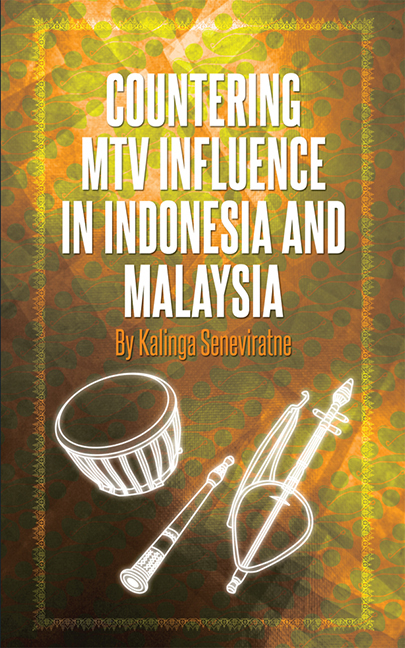Book contents
- Frontmatter
- Contents
- Preface
- 1 Introduction
- 2 Malay Cultural Landscape and Identity: Malaysia and Indonesia
- 3 Music, Islam, and Modern Cultural Identities
- 4 Pop Music, Cultural Imperialism, and Localization
- 5 Case Studies
- 6 Countering Cultural Imperialism: Theoretical Analysis
- References
- Index
- About the Author
1 - Introduction
Published online by Cambridge University Press: 21 October 2015
- Frontmatter
- Contents
- Preface
- 1 Introduction
- 2 Malay Cultural Landscape and Identity: Malaysia and Indonesia
- 3 Music, Islam, and Modern Cultural Identities
- 4 Pop Music, Cultural Imperialism, and Localization
- 5 Case Studies
- 6 Countering Cultural Imperialism: Theoretical Analysis
- References
- Index
- About the Author
Summary
This study involves three major elements — Music Television or MTV Networks, the music of Malaysia, and the music of Indonesia — and it is basically a study of how these three interact in a modern cultural setting. This chapter will thus introduce these three elements as well as discuss briefly the principal theoretical perspectives used in the study.
The Development of MTV Networks
Music Television (MTV) is not merely a music distributional television channel. It is also a lifestyle distributional television channel that exerts tremendous influence on youth around the world and in turn is influenced by youth audiences located within local cultures of scale.
Established in 1981 by Warner-Amex Satellite Entertainment Company, a joint venture of Warner Communications and American Express, MTV has attempted to expand the pop music mainstream in new markets around the world in tandem with the liberalization of TV markets and the emergence of pay-TV platforms. When the music industry was looking for a new promotional tool, MTV began broadcasting the “show reels” that music groups were producing to introduce their music to promoters. MTV, which started with an investment of US$20 million, operated as a twenty-four-hour cable TV music video channel. In 1986 U.S. media giant Viacom acquired the channel, which by then had fifty-five million subscribers. Viacom expanded the network by creating five global divisions: MTV Europe, MTV Brazil, MTV Japan, MTV Latino, MTV Mandarin, and MTV Asia (Denisoff 1988).
MTV Networks' diverse holdings include interests in television, digital media, publishing, home video, radio, recorded music, recreation, licensing, and merchandizing. With 150 channels worldwide, MTV Networks owns and operates not only Music Television, but also a number of other channels, including childrens' television channel Nickelodeon and comedy channel COMEDY. Today MTV reaches some 510 million households in 160 countries in thirty-three languages. Eight out of ten MTV viewers live outside the United States. Tim Brooks (cited in Clark 2001), TV historian and co-author of The Complete Directory to Primetime Network and Cable Shows, writes of MTV: “They live in today. That means being eternally hip and contemporary.”
- Type
- Chapter
- Information
- Countering MTV Influence in Indonesia and Malaysia , pp. 1 - 43Publisher: ISEAS–Yusof Ishak InstitutePrint publication year: 2012

